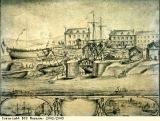Bristol’s entry into the Slave Trade
Before 1698 the Royal African Company, a trading company based in London, had control (a monopoly ) in Britain on all trade with Africa. With this monopoly, only ships owned by the Company could trade for gold, ivory, wood for dye, spices and slaves. Any other companies or merchants trading with Africa would have been acting illegally. With their international trade contacts, Bristol merchants were well-placed to enter the African trade. We do not know exactly when Bristol ships first entered the trade in African slaves, but evidence suggests that Bristol was illegally trading to Africa for slaves at least as early as the 1670s. Bristol’s merchants were willing to risk the penalties of being caught because of the profits to be made. If caught they might lose their ship and any ‘cargo ’.
The Society of Merchant Venturers in Bristol wanted to get a share of the African slave trade. It repeatedly asked the government to change the rules that allowed the Royal African Company to have control over trade. The Society of Merchant Venturers agreed in 1690 to ask the Houses of Parliament “… for letting in the merchants of this Citty to a share in the African trade…”.
In 1698, after much pressure from smaller ports around Britain, such as Bristol, Liverpool and Lancaster, the Royal African Company’s control over the trade for slaves was broken. Local shipbuilding yards in Bristol, such as the one shown here, would have been involved in fitting out ships for the trade. This drawing shows the shipbuilding yards of Sidenham Teast in the docks at Bristol. Ships were built and refitted here by four generations of the Teast family, from about 1750 to 1841. In this drawing, there seems to a black shipwright in the ship on the left.
In 1698, Bristol’s first slave ship, called the Beginning and owned by Stephen Baker, sailed from Bristol to the African coast. The captain purchased a number of enslaved Africans, and delivered them to the island of Jamaica, in the Caribbean. There they were sold and put to work on the plantations.
Many ships followed, such as the Southwell frigate pictured here, which made two slave voyages from Bristol in 1746 and 1748. The ship was owned by a group of Bristol merchants, Michael Beecher & Co, James Laroche, Martin French and William Miller & Co. In 1746, the ship delivered 629 enslaved Africans to the Caribbean islands of Jamaica and Antigua. It was reported that 150 died crossing the Atlantic Ocean, probably due to sickness because of the harsh conditions. In 1748, on a voyage to Angola, West Africa, the captain was instructed to buy 500 slaves. It is not known how many he did buy, but only 284 enslaved Africans were delivered to America.
The transatlantic slave trade, so-called because of the route taken by the slave ships across the Atlantic Ocean from Africa to the Caribbean and North America, had an enormous effect on Bristol. Between 1698 and 1807, a known 2,108 ships left Bristol for Africa to exchange goods for enslaved Africans and take them to the Caribbean. Many other English and European ports of the time were also involved in the trade, such as London and Liverpool in Britain and Nantes in France. Bristol was a wealthy city and trading port before its involvement with the transatlantic slave trade. The profits from the trade made it wealthier. The next chapters in this section show how wide this impact really was on the city and on those who lived and worked in the surrounding areas.




